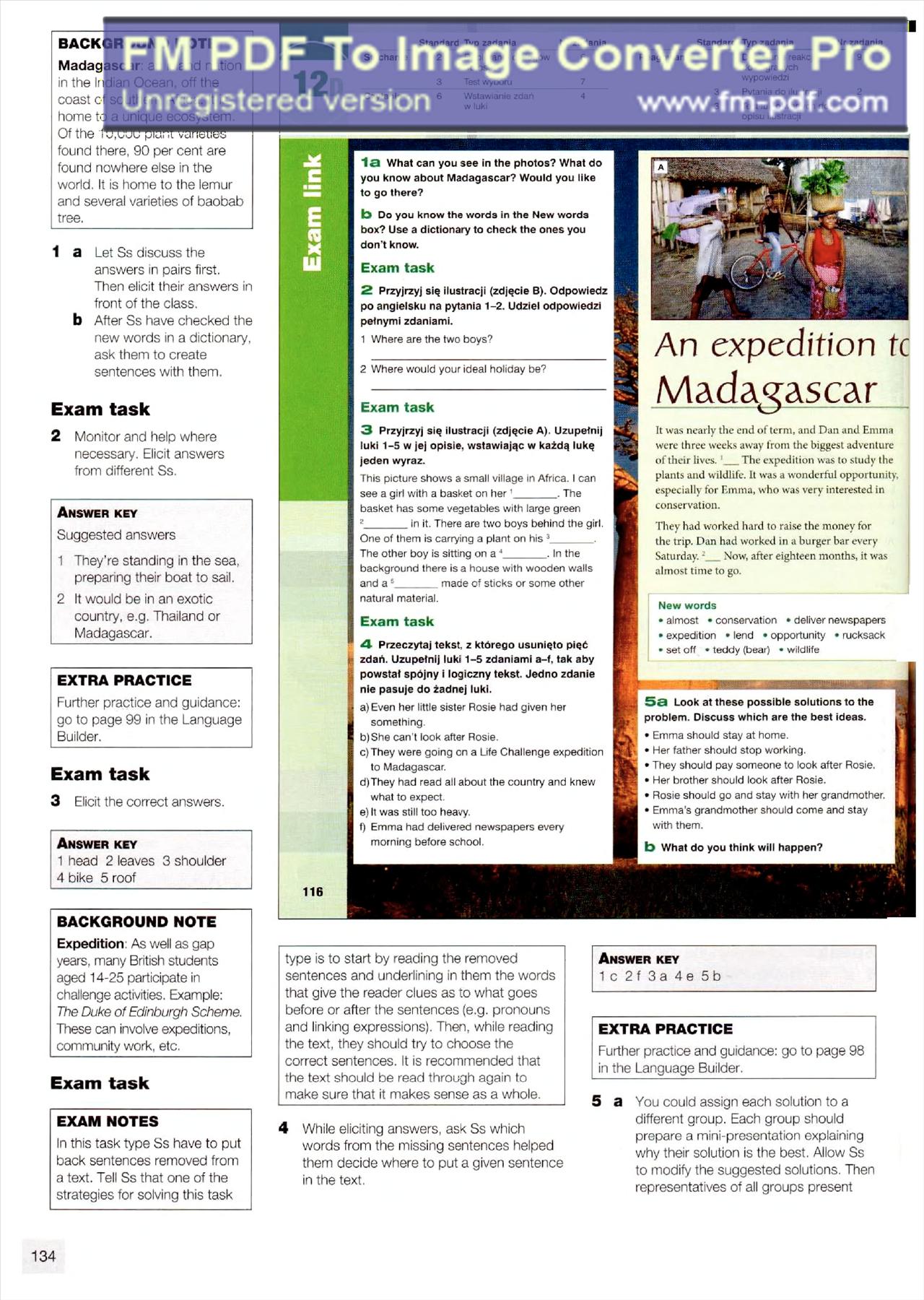Up¾at 3 Teacher's Book podrecznik nauczyciela plus odpowiedzi ,testy,klucz answer key Page 133

Madaga;
in the In^l coast cl home t<:
Of the iv,wu piur.i ycinuuws found there, 90 per cent are found nowhere else in the world. It is home to the lemur and several varieties of baobab tree.
1 a Let Ss discuss the
answers in pairs first.
Then elicit their answers in front of the class. b After Ss have checked the new words in a dictionary. ask them to create sentences with them.
Exam task
2 Monitor and help where necessary. Elicit answers from different Ss.
1a What can you see in the photos? What do you know about Madagascar? Would you like to go there?
b Do you know the words in the New word3 box? Use a dictionary to check the ones you don’t know.
2 Przyjrzyj się ilustracji (zdjęcie B). Odpowiedz po angielsku na pytania 1-2. Udziel odpowiedzi pełnymi zdaniami.
1 Where are the two boys?
2 Where would your ideał holiday be7
Suggested answers
1 They’re standing in the sea. preparing their boat to sail.
2 It would be in an exotic country, e.g. Thailand or Madagascar.
Further practice and guidance: go to page 99 in the Language Builder.
Exam task
3 Elicit the correct answers.
3 Przyjrzy) się ilustracji (zdjęcie A). Uzupełnij luki 1-5 w jej opisie, wstawiając w każdą lukę jeden wyraz.
This picture shows a smali village in Africa. I can
see a girl with a basket on her1_. The
basket has some vegetables with large green
2_in it. There are two boys behind the girl.
One of them is carrying a plant on his 3 ___.
The other boy is sitting on a 4_. In the
background there is a house with wooden walls andas_ mace of sticks or some other natural materiał.
4 Przeczytaj tekst, z którego usunięto pięć zdań. Uzupełnij luki 1-5 zdaniami a-f, tak aby powstał spójny i logiczny tekst. Jedno zdanie nie pasuje do żadnej luki.
a) Even her little sister Rosie had given her something.
b) She can t look after Rosie.
c) They were gomg cn a Life Challenge expedition to Madagascar.
d) They had read all about the country and knew what to expect.
e) It was still too heavy.
f) Emma had delivered newspapers every morning before school.
It was nearly the end ot'term, and Dan and Emma were three weeks away front the biggesl adventure
uf their livcs. _The expedition was to study the
plant* and wildlifc. It was a wondcrful opportunity, especially for Emma, who was very interested in conservation.
They had worked hard to raise the money for the trip. Dan had worked in a burger bar every Saturday. Now, after eighteen months, it was alrnost time to go.
New words
• alrnost • consen/ation • deliver newspapers
• expedition • lend • opportunity • rucksack
• set off • teddy (bear) • wildlife
5a Look at these possible Solutions to the problem. Dlscuss which are the best ideas.
• Emma should stay at home.
• Her father should stop working.
• They should pay someone to look after Rosie.
• Her brother should look after Rosie.
• Rosie should go and stay with her grandmother.
• Emma’s grandmother should come and stay with them.
b What do you thlnk will happen?
Expedition: As well as gap years. many British students aged 14-25 participate in challenge activities. Example: The Duke ofEdinburgh Scheme. These can involve expeditions, community work. etc.
Exam task
type is to start by reading the removed sentences and underlining in them the words that give the read er clues as to what goes before or after the sentences (e.g. pronouns and linking expressions). Then, while reading the text, they should try to choose the correct sentences. It is recommended that the text should be read through again to make surÄ™ that it makes sense as a whole.
In this task type Ss have to put back sentences removed from a text. Tell Ss that one of the strategies for solving this task
4 While eliciting answers, ask Ss which words from the missing sentences helped them decide where to put a given sentence in the text.
5 a You could assign each solution to a different group. Each group should prepare a mini-presentation explaining why their solution is the best. Al Iow Ss to modify the suggested Solutions. Then representatives of all groups present
134
Wyszukiwarka
Podobne podstrony:
Up?at 3 Teacher s Book podrecznik nauczyciela plus odpowiedzi ,testy,klucz answer key Page 059 BACKG
Up?at 3 Teacher s Book podrecznik nauczyciela plus odpowiedzi ,testy,klucz answer key Page 121 BACKG
Up?at 3 Teacher s Book podrecznik nauczyciela plus odpowiedzi ,testy,klucz answer key Page 012 Large
Up?at 3 Teacher s Book podrecznik nauczyciela plus odpowiedzi ,testy,klucz answer key Page 046 quiet
Up?at 3 Teacher s Book podrecznik nauczyciela plus odpowiedzi ,testy,klucz answer key Page 051 Get s
Up?at 3 Teacher s Book podrecznik nauczyciela plus odpowiedzi ,testy,klucz answer key Page 055 Vocab
Up?at 3 Teacher s Book podrecznik nauczyciela plus odpowiedzi ,testy,klucz answer key Page 058 4Comp
Up?at 3 Teacher s Book podrecznik nauczyciela plus odpowiedzi ,testy,klucz answer key Page 078 e Con
Up?at 3 Teacher s Book podrecznik nauczyciela plus odpowiedzi ,testy,klucz answer key Page 079 1 a S
Up?at 3 Teacher s Book podrecznik nauczyciela plus odpowiedzi ,testy,klucz answer key Page 093 BACKG
Up?at 3 Teacher s Book podrecznik nauczyciela plus odpowiedzi ,testy,klucz answer key Page 096 8Voca
więcej podobnych podstron